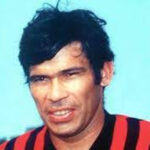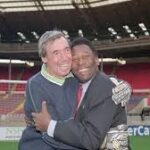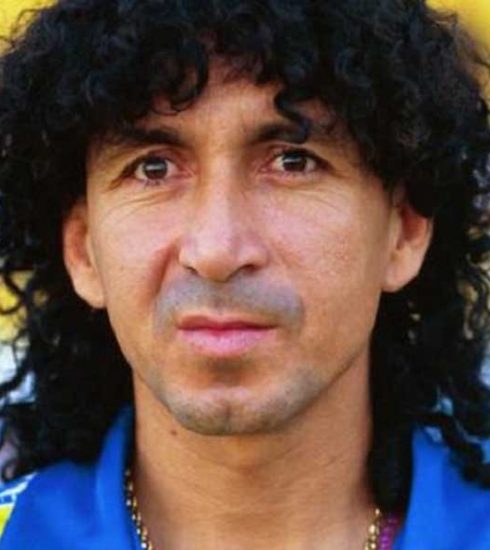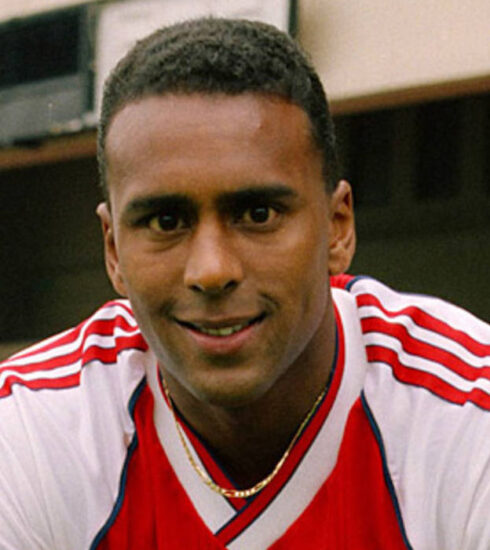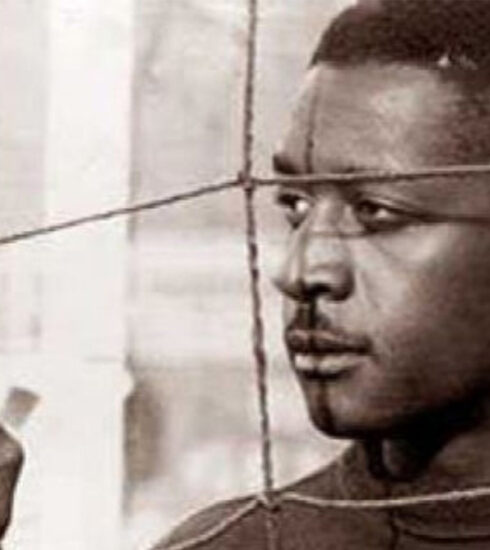GORDON BANKS: Destiny in that car overtake



“I was convinced that Jairzinho would not have made it in time to reach that ball.
But above all, I was convinced that even if he did, he would have been unable to do anything other than put a low ball at the first post where Tostao was coming in.
That is why I took that step forward to cover that very area.
Instead, when I saw the ball pass over my head and with a perfect arc go towards the second post, I turned around, hoping with all my heart that there was no Brazilian footballer in that area.
Instead there was one.
Himself, the most fearsome of them all: Pelé.
I saw him soar into the sky and then hit the ball hard, smashing it down less than a metre from the second post, the one I had decided a moment before that I would not need to protect.
“I’m too far away!” I thought in that split second.
But I dived anyway, stretching as far as I could and managing to somehow touch the ball with my fingertips.
I was sure, but really sure, that the ball would go under the crossbar.
When I saw it go over that damn white horizontal bar the only thing I could think was “What an ass you have Banksy!”
Pelé had already raised his arms in celebration of the goal … and a moment later I saw Tostao put his hands in his hair.
At that moment I realised it must not have been a bad save …
It’s 7 June 1970.
The second match of the qualifying round of the Rimet Cup is being played in Guadalajara. Facing the defending champions England and the Brazil of Pelé, Rivelino, Tostao & Co. one of the favourites for the final victory. The match was balanced and the result was still nailed on zero-zero.
Carlos Alberto, the right-back of that great Brazil, plays a ball vertically on his lane. It is a ball kicked from the outside right. One of those balls with the ‘tide counter’ that lands perfectly between the feet of right winger Jairzinho. His ball control is excellent. He slows down his run for a moment and then suddenly accelerates, jumping over England’s left-back Terry Cooper with ease. In doing so, however, Jairzinho seems to carry the ball a little too far and the goal line is now very close. The Brazilian number 7 lengthens his stride and manages to cross just before the ball crosses the white line.
It is a perfect cross, the kind that makes all centre-backs happy. It is arched but not slow and arrives exactly at the second post, a couple of metres outside the small area.
When Pelé rises into the sky to hit that ball with his forehead, there is no one, neither at the Estadio Jalisco in Guadalajara nor in front of the television screens of the first football championship broadcast in colour and worldwide, who has a single doubt: that ball will end up in the back of the net and put Brazil ahead.
In goal for the English, however, is Gordon Banks.
It is his seventh game in a World Cup final and so far they have only managed to score in two matches: Eusebio on a penalty kick in the semi-final four years earlier and the Germans twice in the final that crowned the English as World Champions for the first time.
For four years running he has been considered the best goalkeeper in the world by FIFA.
The ball bounces a metre before the goal line and is heading upwards to finish its run under the crossbar of the goal defended by the English goalkeeper.
There is only one chance.
Dive in and try to deflect that ball by PERFECTLY calculating the bounce of the ball. To miss by even a few inches would make that ball uncatchable.
Gordon Banks makes it. The ball finishes its run behind his goal just as Pelé is shouting ‘goal’ and has already raised his arms to the sky.
This save will go down in the legends of the sport … to such an extent that Pelé himself will be forced to admit that “I have scored more than a thousand goals in my career and yet the question I am asked most often is about a goal I did not score …”

Gordon Banks’ ‘ass’ would not last long.
The day before that World Cup quarter-final match against West Germany, the England Lions’ goalkeeper suffers food poisoning.
England’s staff doctors do everything they can to get him back on track for what is widely regarded as a rematch of the World Cup final four years earlier.
There is nothing they can do.
Banks will have to forfeit and the Germans will win that match by three goals to two after extra time.
In his place will play poor Peter Bonetti, who will have serious responsibilities in at least two of the Teutonic goals.
Everyone agrees (including the German players) that with Banks in goal things would in all likelihood have turned out differently.
Fate, however, has something far more tragic in store for the goalkeeper born in Sheffield on 30 December 1937.
It is 22 October 1972 and Banks is on his way home from a physiotherapy session at the Victoria Ground, home of Stoke City, the team in which he has played since 1967, to treat a shoulder problem.
He is driving his Ford Consul and in front of him is a lorry that is proceeding very slowly.
Banks decides to overtake it, but just at that moment another vehicle, an Austin A60 van, is coming up the opposite lane.
The impact is inevitable.
The injuries are mainly to his face where he will be given over 200 stitches.
The biggest problem, however, concerns his right eye.
There will be weeks of operations, treatment and consultations … but eventually Gordon Banks will lose the sight in that eye.
Despite being almost 35 years old Gordon Banks is still the undisputed starter for the England Whites as they begin the qualifying round for the 1974 World Cup in Germany.
Sir Alf Ramsey as Banks’ replacement decides to call upon Peter Shilton, who replaced Gordon Banks at Leicester a few years earlier.
But even here there is room for regret.
In the decisive match for World Cup qualification at Wembley against Poland in October 1973, it was Peter Shilton’s error on a far from irresistible shot from Poland’s Jan Domarski that resulted in England’s exclusion from the German World Cup.
… and here, as in Mexico, everyone agreed that Gordon Banks would never have taken a goal like that.
Only a few months earlier, in the summer of 1973, Banks realised there was nothing more he could do. The loss of his right eye can no longer allow him to play at pre-injury levels and he announces his retirement.
Stoke City entrusted him with the job of youth goalkeeping coach and Banks threw himself heart and soul into his new role.
More than four years have already passed since the accident when something unexpected and utterly surprising happens.
Banks realises that his left eye has largely succeeded in ‘compensating’ for the blindness of the other and that his field of vision is much wider than it was immediately after the accident.
He can start doing again what he loves best: putting on his gloves and returning to defending a goal with the knowledge that he can still manage very well.
The news is starting to circulate and several English league teams are showing interest. It was, however, a team from the newly formed US league that beat everyone to the punch and snapped up his services: it was the Fort Lauderdale Strikers who, in the 1977-1978 season, included the almost 40-year-old Yorkshire goalkeeper in their ranks.
The results will be simply sensational.
The Strikers will be first at the end of the Regular Season and Gordon Banks will be elected best goalkeeper in the league.
The following year, however, came the fateful moment to hang up his gloves.
At the age of almost 41, Banks left football.
In his case, among the many numbers and statistics of an exceptional career, one is essentially enough: that of being considered the 2nd best goalkeeper of the 20th century behind Lev Yashin and ahead of our own Dino Zoff.
ANECDOTES AND TRIVIA
Gordon Banks was born in Abbeydale, near Sheffield. After a few years the family moved to Catcliffe where the father set up a betting agency (still illegal at the time). The standard of living for the Banks family improves considerably, but a serious incident soon disrupts young Gordon’s life.
Thugs enter the agency to rob the daily takings. The only one present at the time is his older brother John, who is attacked and beaten.
He dies shortly afterwards as a result of the injuries he received during that robbery.
At the age of 15, Gordon Banks dropped out of school. For him, as for most Yorkshiremen at the time, there is a place in the mines.
Banks will admit at every opportunity that his strength and explosiveness between the posts are due to those immense efforts at carrying coal that have allowed him to toughen up his shoulders and back.
After a season at Chesterfield Banks was bought by Leicester City.
The beginnings are anything but easy.
In the 1959-1960 season there were no less than five goalkeepers in the squad, including the Scottish national Johnny Anderson.
His stubbornness and his constant desire to learn and improve convinced manager Matt Gillies after a few weeks to deploy him as a starter in the ‘Reserves’ team, effectively becoming the first alternative to starting goalkeeper Dave MacLaren.
However, it took an injury to the latter to open the doors of the first team for Banks. A few games later, Gordon Banks became an immovable starter for the Foxes.
In 1967, only a year after becoming world champion with the English national team, Leicester coach Gillies, supported by the management, informed Banks that he was no longer deemed up to the starting role. “We think your best days are behind you Gordon. We therefore invite you to look for a new team’. The reason for this choice is seemingly simple: a young goalkeeper of great ability has emerged from the youth sector that Leicester intend to focus on. His name is Peter Shilton and this will not be the last time that the destinies of these two great goalkeepers will cross.
However, the sum demanded by Leicester is important: for the time, £50,000 is a lot and the big clubs of the First Division are reluctant to invest it for a goalkeeper now in his thirties. The only one absolutely convinced that Banks is still an excellent investment will be Bill Shankly, who will do everything he can to bring him to his Liverpool team… without succeeding, however, as the management board will not support his decision.
Banks will sign for Stoke City, a team with no particular ambitions and which is steadily cruising in the middle-lower ranks of the First Division.
“I didn’t come here to play a few years before I retire. I came here to win trophies,’ these were Banks’ words on the day of his presentation.
With him Stoke slowly began to climb the ladder.
In 1971 and 1972 the Potters came within a step of the Fa Cup final. On both occasions it was the Arsenal Gunners who denied Banks and his team-mates this joy.
In the second of these, in April 1972 after a draw in the first match Arsenal beat Stoke thanks to a questionable penalty by Mc Lintock and a blatantly offside goal by John Radford. “I have never felt so cheated and robbed in my life,” Banks will claim at every opportunity when talking about that match.
Eventually, however, Gordon Banks managed to fulfil the promise he made on the day of his arrival at Stoke.
On 4 March 1972, Stoke City lifted the English League Cup after beating Peter Osgood’s Chelsea and co. in the final at Wembley.
… the only trophy won by Stoke in its 157-year history …
In the 1962-1963 season Leicester even found themselves fighting for an incredible ‘Double’. In the FA CUP final after defeating Liverpool in the semi-finals and in second place just one point behind Everton with only four days to go. On the very last day of the season Gordon Banks suffered a fractured finger in the match against West Bromwich Albion that forced him to miss all the remaining games.
Leicester would lose them all, even finishing in fourth place. He returned just in time to play in the FA CUP final, which Leicester lost by three goals to one against Matt Busby’s Manchester United and the youngsters Denis Law and Bobby Charlton.
In the FA CUP semi-final against Liverpool mentioned above Gordon Banks played probably his greatest game of his career. The match was an authentic siege of the Reds of the great Scottish manager Bill Shankly. The statistics tell of 34 shots on goal by Liverpool against just one by Leicester … that of Mike Stringfellow which gave Leicester the victory in the final one-nil!
One of the most curious episodes of Gordon Banks’ career was the goal scored by George Best during a match valid for the defunct (and beautiful!) Inter-British Tournament between England and Northern Ireland.
Banks has the ball in his hands and is preparing to put the ball back into play.
Best is in front of him trying to obstruct the throw-in.
Banks makes a couple of feints to get rid of the number 11 in the green shirt and find space to kick the ball back with his feet.
He shifted the ball to his left, but when he lifted it into the air to kick Best, who was very quick to anticipate him, kicked the ball forward and deposited it into the net in the unguarded goal.
The goal (very regular!) will instead be annulled, avoiding Banks a not exactly exceptional figure and depriving George of the joy of a goal for the English… who will then win the match by one goal to nil.
Finally, the wonderful exchange that took place that day in Guadalajara immediately after Gordon Banks’ historic save on Pelé’s header.
Pelé: ‘I was really convinced I had scored,’ says the Brazilian dejectedly.
Banks: “There were two of us!” the English goalkeeper replies, smiling.
On the scene a moment later comes Bobby Moore, captain of the English team.
“You’re getting old Banksy. Once a ball like that you would have blocked it …”


